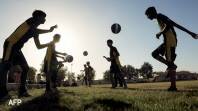Pakistan’s fascination with foreign coaches must end if the four-time World Cup champions are to reclaim lost glory, hockey legend Shahbaz Ahmad says.
Dutchmen Hans Jorritsma, Roelant Oltmans and Michel van den Heuvel have managed the Green Shirts in a little over last decade-and-a-half but with indifferent results.
Apart from Jorritsma, who guided the team to the World Cup win in 1994 and the Champions Trophy the same year, others (which also includes former Pakistan players) have failed to arrest the country’s slide in the last 15 years.
In the 2010 World Cup, Pakistan finished last in the 12-team championship held in New Delhi.
“We brought so many foreign coaches for the last nine to 10 years. Are they loyal to the country they coach? They pretend to be loyal. Even if you pay them a salary of $1m they will not be loyal,” Shahbaz says.
“They (the foreign coaches) will not allow you to win. India and Pakistan must shed their fascination for foreign coaches if they want to achieve any success in world hockey. We should trust our people to train our own boys because there has to be a level of comfort in communication and understanding between a coach and his players and that can come only if there is a local coach,” Shahbaz says.
He also called for arch-rivals India and Pakistan to stop resisting change (if they wanted) to become a dominant force again.
India, eight-time Olympic champions, secured the 8th spot in the 2010 World Cup. Neither team reached the semi-finals of the London Olympic Games in August this year.
“When the Europeans were changing their style of play, we (India and Pakistan) were stagnant. We should embrace the modern game and improve our coaching system. We have to work hard on our grass roots development programmes,” the 1994 World Cup winning captain adds.
“Our mode of selection has not changed. The things we were doing 20 years ago are what we are still doing,” he says.
Excerpts from an interview with one of the world’s greatest players on whom Pakistan’s fortunes depended for well over a decade.
So is there a chance of Shabhaz Ahmad becoming a coach of Pakistan hockey team?
I would love to do that. I have played for 20 years but for some reasons the powers-that-be are keeping me away. I don’t trust these people. They are spending so much money and energy to retain their positions. The money they have spent in the last two-three years, we would have spent in a decade, but with no results. They cannot upgrade hockey. If they last another four years hockey will be destroyed in Pakistan.
Will you be ready to take any other post in the near future?
What I can give back to Pakistan hockey is that I am willing to be an advisor or work as an administrator, where I can organize things with small teams, but as I told you earlier not with the people in whom I do not have trust. Trust is important in any relationship. My focus will be on infrastructure and coaching programmes. The plan should be to select an Under-20 team and retain them for four to five years and continue till the senior level. It is better to retain the same coach. We need right people for the right job. We should engage in Test series more often which would be a good exposure. A lot of administrative effort will also be needed in the entire programme.
Are you hopeful that Asian hockey will bounce back to regain past glory?
I hope we can, we need sincere people. We need planning and vision.
Are there enough qualified coaches from Asia who can take the top job?
There are three to four coaches whose names come to mind. Tahir Zaman and Kamran Ashraf are two. Zaman is a top coach and is into coaching education, empowering coaches throughout the world. The problem is we don’t trust them.
Do you regret missing out on winning a gold medal at the Olympics?
I have no regrets. There are plenty of people in India and Pakistan who have won an Olympic medal but did not achieve what I could. I am happy that many people idolize me and I am a role model for them. I am happy that I could create history. I still remember
Sydney (in 1994) like it was yesterday, when we won the World Cup and the national anthem was playing. I cannot forget those moments and I am happy that I could contribute substantially.
Is there any initiative to restart the India-Pakistan hockey Test series now that the cricket series has already been announced?
I do not know about it. But both nations should sit together and organize it. I have told Pakistan hockey officials, unless and until you introduce India-Pakistan series you will not get (new) stars. When you play against each other, you get good players. They should continue this on an annual basis. It is the best way to promote and improve hockey.
Are you in favour of hosting India-Pakistan matches at neutral venues?
I do not like the concept of organizing matches in third countries. Who will you get as spectators? You can have the matches in Doha or in Dubai, but, then a lot of kids (in India and Pakistan) will miss the matches (if it is held at a neutral venue). I want the kids to come along with their families to the ground and enjoy the matches involving India and Pakistan and get inspired.
I see a lot of kids playing cricket on the streets in Pakistan, cricket with tennis ball. Even shopkeepers get involved in cricket. That kind of interest we cannot generate in hockey. But with the India-Pakistan hockey Test series, we can enhance the value of the game. Their encounters are often sensational raise a patriotic current.
What steps would you suggest for the improvement of the game in the subcontinent?
When officials of India and Pakistan meet, they have their own agenda — to retain their key positions in the federations and committees. We need to get hockey back to the prime position it was.
We need to introduce hockey in schools and colleges. The problem in Pakistan and Indian hockey is that people with knowledge of the game are keeping away from the game due to the unproductive system. We do not share knowledge and we do not meet often. We need to form small hockey development teams to prepare and carry the development programmes forward. The problem is that we are power hungry, which is damaging hockey.
What do you mean by unproductive system?
Our associations are moving in the opposite direction. They are appointing coaches and managers to please someone. Even the selections are not fair.
Has the introduction of Astroturf dealt a body blow to grass produced artistry?
If you go back to grass, we would be world champions (again). There is a big difference in grass and Astroturf. (If you are little bit unfit and playing on an Astroturf, then everybody can make out. If you ask me today, I can go and play for half an hour on grass but on Astroturf, I will be able to last only ten minutes. The other thing is transfer of same ideas for the surfaces is not possible. The thinking has to be different.
Do you think the new rule changes like scrapping the off-side rule introduced by FIH has affected the Asian countries the most?
The rule changes are very good, especially the self-start rule. If this rule was in vogue in my time, any defender in the world would have had a hard time catching up with me. Sadly, we haven’t used this rule to our advantage — again because our players are more concerned about ball possession.
Should we Asians be playing against the European teams on a regular basis?
When we were world champions, or when Indians were world champions, did we play against the Europeans often? No. So, that is not the issue.
Play against the Europeans, but you cannot learn artistic hockey from the Europeans. Actually, we have all but abandoned our style. We are trying to imitate the Europeans, but we cannot get there. There has to be some individual effort — like I did, and my other team-mates, like Hassan Sardar, did.
So Asian countries should have four-to-five system of play?
Frankly, I see there is no system of play involving India and Pakistan. I suggest we should play aggressive hockey and artful hockey, not a ‘football-style’ game. We need our forwards to dribble past two players — if you get past two or three players, the European teams get jittery. In 1994, I made such a difference with individual play. You should use the skill in time and passing should be in time as well. We learn from childhood that as soon as we receive the ball, we have to take two-three touches, and then look for a team-mate to release the ball. That approach is flawed. In modern hockey, even before a pass is received, the player has to know where he is going to relay that ball.
The writer is a senior sports journalist based in Doha, Qatar where the interview was conducted.
























